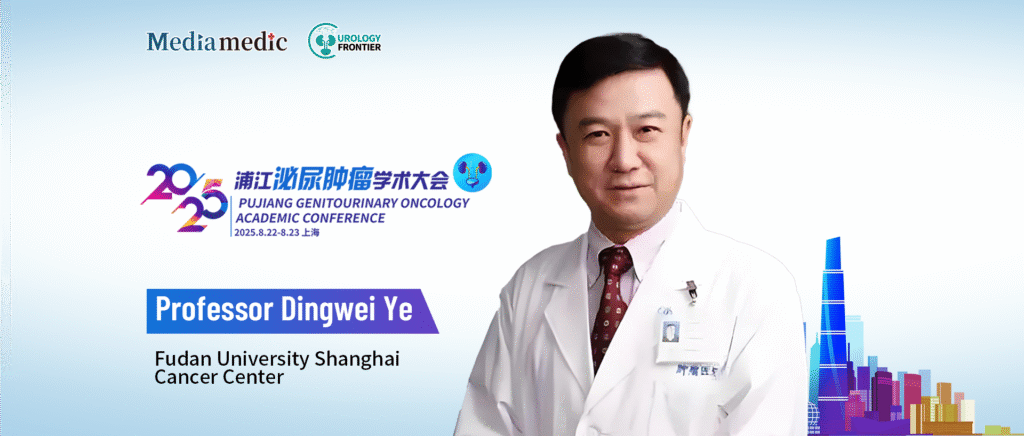
Insights from the 2025 Pujiang Urologic Oncology Congress
Editor’s Note: The 2025 Pujiang Urologic Oncology Congress was held in Shanghai from August 22–23 under the theme “Precision Breakthroughs · Integrated Innovation · Whole-Course Optimization.” For the first time, the congress combined academic sessions on kidney cancer, bladder cancer, and urothelial carcinoma into a unified forum. It brought together leading domestic and international experts to discuss innovations in diagnosis, treatment, multidisciplinary collaboration, and translational research, advancing the field of urologic oncology in China toward greater precision, individualization, and internationalization. On this occasion, Oncology Frontier – UroStream interviewed the congress chair, Professor Dingwei Ye of Fudan University Shanghai Cancer Center, to highlight the significance of this year’s meeting and the latest developments in urothelial carcinoma management presented at the congress.
Oncology Frontier – UroStream: The Pujiang Urologic Oncology Congress has been held for several years. What kind of academic brand effect has it created? As congress chair, could you highlight the features of this year’s meeting?
Professor Dingwei Ye: The Pujiang Forum has been held for over a decade and has become one of the most authoritative academic meetings in the Chinese urologic oncology community. In the past, separate meetings were organized for kidney cancer, bladder cancer, and urothelial carcinoma. This year marked the first time these disease-specific forums were combined into a single urologic oncology congress.
The main themes this year were precision, innovation, and whole-course management. These themes apply not only to surgical approaches but also to integrated therapies and clinical trials. They cover early- as well as mid- to late-stage patients, particularly in the context of multidisciplinary team (MDT) management. Importantly, several new clinical research data were shared and showcased, significantly raising the level of academic exchange. The meeting also incorporated live-streaming to broaden its impact and further promote the development of urologic oncology in China.
Oncology Frontier – UroStream: At the main session you presented on “Clinical Research-Driven Innovations in Urothelial Carcinoma.” In your view, what trends are shaping clinical research in China’s urologic oncology field, and how has your department at Fudan contributed?
Professor Dingwei Ye: The path to breaking through in urothelial carcinoma management through clinical research can be summarized in three directions.
First is early detection, screening, and precise diagnosis. Our team, in collaboration with biotech companies, developed an RNA-based diagnostic test combined with artificial intelligence algorithms. This test has obtained national Class III medical device certification in China and, along with its U.S. counterpart, received an A-level recommendation from the American Urological Association (AUA). It enables more than 60 percent of early-stage patients to avoid invasive cystoscopy, reducing both patient discomfort and healthcare costs—a truly groundbreaking achievement. We have also launched a nationwide clinical research program across more than 200 centers to further validate its role in early diagnosis of urothelial carcinoma.
Second, in surgery, beyond improving and optimizing procedures such as transurethral resection of bladder tumors (TURBT), repeat TUR, and radical cystectomy, we are working to address unmet clinical needs. Based on clinical research findings, we are actively exploring perioperative therapies to improve five-year survival rates and reduce recurrence and metastasis in urothelial carcinoma patients.
Third, for advanced urothelial carcinoma, progress in multidisciplinary management is being driven by new clinical studies and innovative therapies. Phase III clinical trials of novel treatments—especially domestically developed antibody–drug conjugates (ADCs) and immunotherapies—are now rapidly enrolling patients in both first- and second-line settings. At the same time, large-scale phase III studies of perioperative neoadjuvant and adjuvant treatments in early-stage disease are also underway. I believe that by next year, important clinical results will begin to emerge.
Professor Dingwei Ye Fudan University Shanghai Cancer Center
Professor Dingwei Ye is Director of Urology and Vice President of Fudan University Shanghai Cancer Center. He is also Head of the Urological Oncology MDT, Director of the Shanghai Urological Cancer Institute, and Director of the Fudan University Prostate Cancer Institute. Professor Ye holds leadership roles in multiple national and international academic organizations, including Chair of the CACA Committee on Male Reproductive System Tumors, Chair of the CSCO Prostate Cancer Committee, and Vice Chair of the CS…He has led more than 60 national and provincial-level research projects and published over 700 papers in top journals such as Nature Genetics, Journal of Clinical Oncology, Lancet Oncology, and European Urology. His honors include first prizes from the Shanghai Science and Technology Progress Awards, the Ministry of Education, and the Chinese Anti-Cancer Association, as well as national recognition as an Outstanding Young and Middle-Aged Expert with Exceptional Contributions by the National Health Commi…(Source: Oncology Frontier – Urology News)


